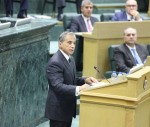You are here
EU rejects Jordan's request for extra facilities under deal
By Mohammad Ghazal - Jul 10,2018 - Last updated at Jul 10,2018
AMMAN — Jordan said on Monday that the EU did not approve Jordan's request for more facilities under the relaxed rules of origin relating to the Kingdom's exports to Europe.
"We held discussions with the EU last week in regard to extending more facilities to Jordan; nothing came out of these meetings and the EU did not approve our request," an official at the Ministry of Industry, Trade and Supply, who preferred anonymity, told The Jordan Times over the phone on Monday.
In February, Jordan submitted a request to the EU requesting the inclusion of more facilities under the relaxed rules of origin deal, which was signed with the EU in 2016.
The Kingdom also asked the EU to increase the number of zones benefitting from the agreement, and requested reviewing one of its conditions related to employing a certain percentage of Syrian refugees for a factory to be eligible to export to Europe.
"Jordan wants to maximise the benefit from the deal as the gains have not been as desired," said the official on Monday.
He added that discussions will be held soon with the EU to look into Jordan's request again.
Under the 2016 deal, manufacturers in the Kingdom can import up to 70 per cent of the raw materials used in production and still label the finished products as ”Made in Jordan”, qualifying them for trade concessions.
The agreement, which is valid till 2026, designates a total of 18 industrial and developmental zones as beneficiaries, while the relaxed rules will also be applied to other industries across the Kingdom as soon as 200,000 jobs are created for Syrian refugees, after they are issued work permits.
For Jordanian industries to be able to benefit from the simplified rules of origin by the EU, each factory needs to have Syrian employees constituting no less than 15 per cent of its manpower. The rate will be increased to 25 per cent in the third year of the agreement.
Tens of thousands of work permits have been issued for Syrians since the agreement was signed.
Related Articles
AMMAN — Minister of Industry, Trade and Supply Tareq Hammouri said that his talks with officials at the European Commission in Brussels have
AMMAN — Jordan has submitted a request to the EU demanding the inclusion of more facilities under the relaxed rules of origin on the Kingdom
AMMAN — Jordan on Thursday said it submitted a request to the European Union demanding the inclusion of agricultural industries and products














